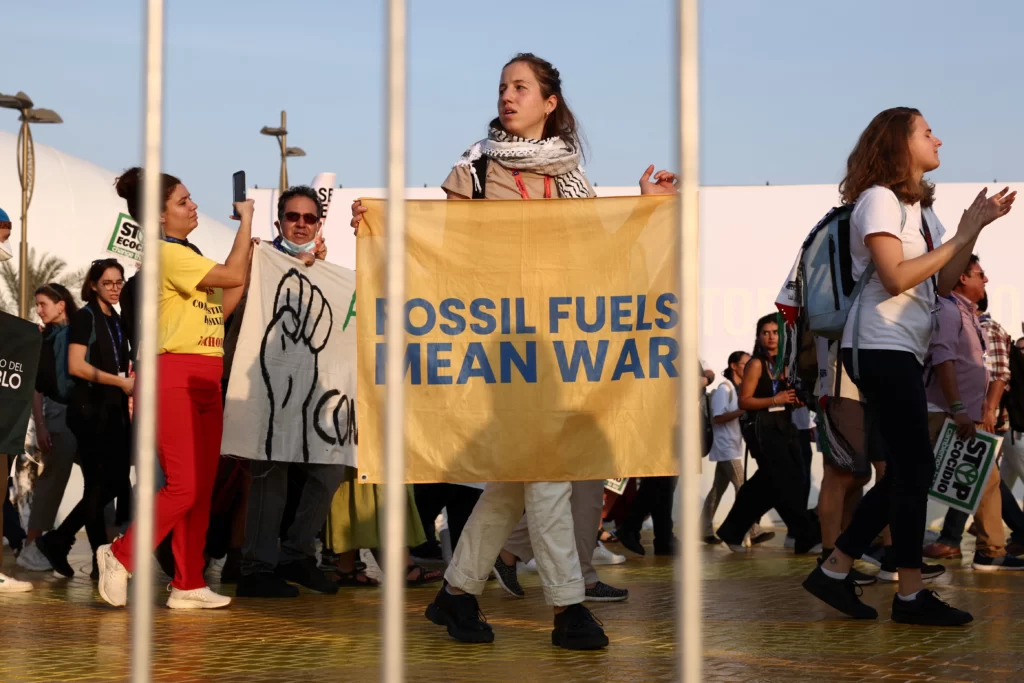
UN climate negotiations jeopardised due to fossil fuel reaction
The UN climate negotiations in Dubai may be jeopardised after several countries reacted angrily to a “weak” draft pact on fossil fuels. The document eliminated language from an earlier draft that said fossil fuels may be “phased out.” There must be agreement from all 198 countries present at the summit, or there will be no settlement. Humans’ use of fossil fuels is causing global warming and endangering millions of lives, yet governments have never agreed on how or when to phase them out.
The European Union’s delegate termed the text “unacceptable” and indicated the union may withdraw. “We cannot accept the text,” said Eamon Ryan, Ireland’s environment minister and an EU negotiator. However, he emphasised that the failure of the negotiations is “not the outcome the world requires.” Politicians from across the world have gathered in Dubai, United Arab Emirates, to tackle the mounting crisis in what is expected to be the hottest year on record. The issue of what to do about greenhouse gas emissions from the usage of oil, coal, and gas has dominated the discussions.
Because he is also the CEO of the Abu Dhabi oil firm Adnoc negotiations, expectations were low that the controversial COP28 President Sultan al-Jaber would deliver a solid accord on fossil fuels. Countries that seek a speedy end to fossil fuels, on the other hand, were more optimistic after Mr Jaber appeared to support a “phase out” of fossil fuels. A draft statement issued on Saturday stated that one possible conclusion of the negotiations was a “phase out of fossil fuels in accordance with best available science.”
Questions persisted about when this would occur and if it would rely on the employment of expensive and experimental technologies to store the carbon dioxide emitted by the combustion of fossil fuels. On Monday, another draft was released that removed any references to “phase out.” Instead, it urged countries to “reduce consumption and production of fossil fuels in a just, orderly, and equitable manner.” While linguistic changes may appear minor, minor discrepancies in UN agreements negotiations can drastically alter what governments are required to do. Many states appear to have had only an hour to review the text before calling a conference of all governments.
Climate-affected countries, where sea-level increases are already destroying houses and storms are killing people, have slammed the proposed agreement. “We will not sign our death certificate,” said a spokeswoman for the Alliance of Small Island States, adding that the group would not agree to a document without “strong commitments on phasing out fossil fuels.” The COP28 president, Mr Jaber, said the wording mirrored his aspirations and was a “huge step forward.”
However, a US spokeswoman stated that the section on fossil fuels “needs to be substantially strengthened.” The proposal was also described as “disappointing” and “does not go far enough” by the United Kingdom. According to a spokeswoman, “there must be an unabated phase out of fossil fuels to meet our climate goals.” The Least Developed Countries Group stated that it could not accept the wording and asked, “Where is the ambition?” Saudi Arabia did not reply to a request for comment, after apparently blocking strong wording on fossil phase out during the meetings.
And poor countries who expected greater help transitioning their economies away from fossil fuels and towards renewable energy are likely to embrace an agreement that focuses less emphasis on phasing out coal, oil, and gas quickly. The most recent agreement does include a goal to triple renewable energy capacity by 2030, which was signed earlier in the discussions negotiations by more than 100 countries. The draft looks to fall short of the success criteria outlined earlier in the day by UN Secretary-General António Guterres. He stated that the success of the discussions will be determined by nations’ capacity to decide on the future of coal, oil, and gas.
The summit would be deemed a success if it achieves “consensus on the need to phase out fossil fuels in accordance with a 1.5C timeline,” he added. Nations have pledged to limit global temperature rise to less than 1.5 degrees Celsius over pre-industrial levels. The discussions are scheduled to end on Tuesday, but they might go on longer if governments disagree on the final agreement.
